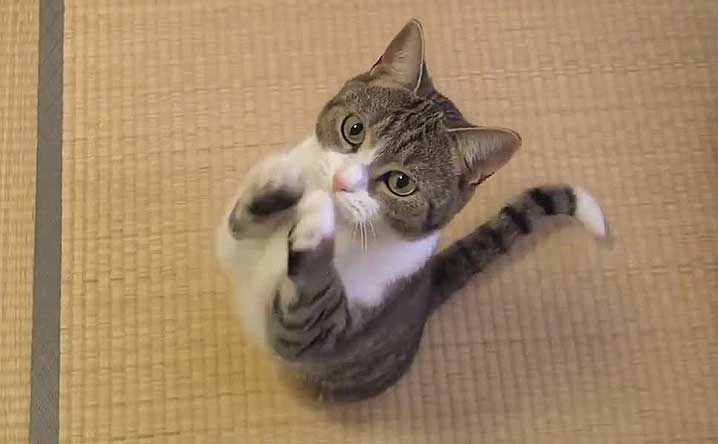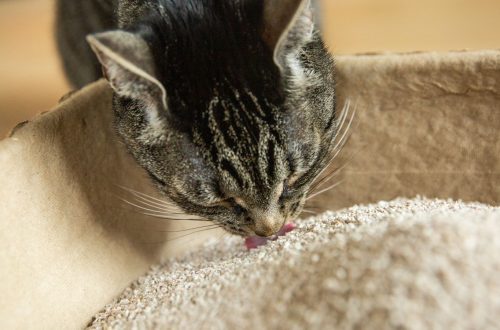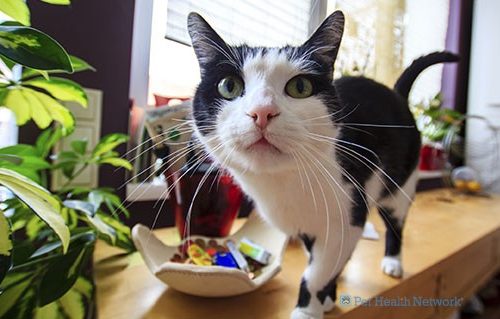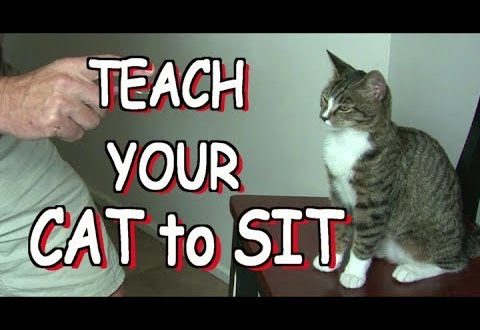
Why is your cat or cat constantly asking for food?
Contents
The pet constantly asks for food: the main thing
The cat constantly asks for food, because it is in the active phase of growth and development.
The cat wants to eat more often if the food does not bring proper saturation.
The pet requires more food if it is cold (during the cold season).
The feeling of hunger does not go away due to medications taken (for example, hormones).
The pet is in the stage of pregnancy / postpartum period.
A cat or a cat constantly wants to eat because it lacks attention.
The cat wants to eat all the time if it suffers from polyphagia (false hunger).
The desire to eat occurs more often due to a rapid metabolism or its violation.
The cat eats a lot, but loses weight due to diseases (worms, diabetes, hyperthyroidism, oncology and other medical reasons).
Do cats feel full?
Cats have a conditional feeling of satiety – otherwise they would eat constantly and without interruption, unable to tear themselves away. Usually, after eating, they settle down in their favorite cozy place, curl up into a ball and sleep sweetly.
The fact that a cat constantly reacts to the rustling of food bags does not mean that she is asking for food. Her instincts just work – the signal is given, you have to run up and meow.
The feeling of satiety can vary: some people eat when they are hungry, others at the first opportunity. Just as people, having had enough of dinner, do not refuse ice cream, so cats will always find a place for “dessert”.
How much food per day is normal?
The number and frequency of meals depends on the age, health status and preferences of the cat. If you feed it too little or inappropriate food, you can ruin your cat’s health. Adding food to a bowl that does not have time to empty, feeding too often and in large portions, you can not be surprised why the cat began to eat a lot. It is not difficult to feed a cat and lead him to obesity, so follow simple rules and your pet will be healthy.
First of all, you need to establish a regular diet. Once you have calculated the required daily amount of food for your cat, divide it into two equal parts and give it at equal time intervals. The mode will allow you to prepare food in advance, and your pet will get hungry at the right time. He will develop a routine of eating and going to the toilet. And remember: the food should be of high quality, and the diet should be complete and balanced.
Norm for kittens
Determining how much food to feed a kitten is quite simple. When buying cat food, you should read what is written on the package – usually the dosage calculation is indicated. The prescriptions of different manufacturers, depending on the saturation of the feed with nutrients and microelements, may differ. In general, a growing organism needs more food than an adult.
The main indicator for determining the daily norm is the weight of the animal. For example, the average volume of high-quality, vitamin-rich dry food intended for kittens up to five months old is calculated as follows: a pet weighing two kilograms is supposed to eat 35 grams, three kilograms – 50 grams, four – 70 grams, five – 85 grams.
Norm for adult cats
For an adult cat, the average daily portion in grams is less: it has reached maturity and needs to maintain health, and not in active growth and development. Approximate dosage of dry food: 3 g of dry food weighing 25 kg, 4 kg – 40 g, 5 kg – 55 g. For a pet whose weight exceeds six kilograms, the daily feed rate is calculated by adding 12 g of food per 1 kg of cat weight.
Norm for animals aged
Usually an older cat is calmer and does not ask for food all the time. The body of such a pet works less actively, and it is normal for him to consume less food. Depending on the needs and appetite of the pet, reduce the serving size for an adult, or feed once a day instead of twice.
Physiological reasons why a cat or a cat eats a lot
Intestinal parasites
The reason for the consumption of feed in excess of the norm and the simultaneous weight loss may be helminthic invasion. If your pet has started to lose weight, feels sick, suffers from constipation or diarrhea, vomiting – he may have worms. A pet affected by intestinal parasites looks downcast, sometimes changes food preferences.
In the late stage of the disease, worms are seen in vomit and stool. Having noticed the first symptoms, be sure to consult a doctor – the veterinarian will prescribe medications to remove helminths.
Indigestibility of nutrients
A pet may also have malfunctions in the body, leading to a decrease in the absorption of nutrients from food. As a result, he does not feel full and begins to ask for food more often. Similar problems can reveal more serious things – up to tumors and oncological diseases.
In order to exclude or confirm this problem, it is necessary to undergo an examination by a doctor and pass certain tests.
Hormonal disbalance
Hormonal disorders are another reason why a pet cannot moderate its appetite in any way. If the endocrine system does not function properly, then diseases develop. Some of the most common are diabetes mellitus, hypothyroidism (or an enlarged thyroid gland), and kidney failure. Some of the symptoms of these diseases: weight loss, constant thirst, indigestion, increased activity.
Blood and other tests will help determine the presence of the disease – it is important to contact the veterinary clinic in time.
Fast metabolism
According to individual characteristics, in some animals it is faster, which means that they are more likely to get hungry and start asking for food. It is difficult not to notice this feature – the accelerated process of digestion leads to more frequent going to the toilet. When feeding the ward, consider this factor: it is worth giving food more often, but in small portions.
In this case, it is worth resorting to the help of a doctor if the pet’s metabolism is suspiciously fast – perhaps a diet or medication is needed.
Pregnancy and lactemia
These states change the habitual behavior of the female. The pet begins to eat more – it should be enough for both her and the fetus. There are quite a lot of babies in the womb, which means that everyone should have enough food. The same applies to the lambing female – distributing nutrients with milk, she must replenish them through food.
For a pregnant or lactating female, increased appetite is a normal condition, so do not worry and limit her in food. Over time, everything will be as before.
reaction to cold
In the cold season, the pet needs more energy – not only for daily needs (running, climbing, playing), but also to keep warm. The pet’s body is designed in such a way that it heats itself, spending additional energy on it. Therefore, in late autumn, winter and early spring, his appetite may increase. To have enough energy, you can slightly increase the volume and calorie content of the portion.
The influence of medicines
Medications that a pet takes can affect his feeling of satiety. Some reduce this indicator quite strongly, so the pet is hungry and cannot tear himself away from the bowl. Among them are drugs for the gastrointestinal tract, against seizures and epilepsy, as well as hormonal drugs.
Therefore, when the doctor prescribes medication for your pet, be sure to ask about possible side effects, find out what to do if they appear.
Consequence of starvation
Sometimes the pet has to starve. For example, there is a forced starvation – due to medical indications or procedures, when the animal simply cannot eat for some time. Regardless of the reasons, after a long abstinence from food, the pet will rush to eat food and will require supplements. The main thing is not to give too much, so that there is no pain in the stomach. It is better to feed more often and in small portions.
Psychological reasons
Lack of attention and affection
An animal may turn its gaze towards food too often if it suffers from loneliness. What to do when bored, sad and the owner is in no hurry to stroke and caress? There is. Also, begging for food, the animal sometimes just wants to draw attention to itself. The task of the owner is not to forget about the needs of the pet: to sit on his knees, play, talk and stroke. Then the pet will forget about food as the only entertainment.
Psychogenic overeating
This disease (polyphagia) is expressed in the fact that the animal experiences false hunger. This happens when eating behavior is disturbed. The reason for this failure, leading to the continuous consumption of food, is often severe stress. The latter can be caused by a move, a visit to the vet, a long absence of the owner.
You need to take care of the pet by organizing the most comfortable atmosphere for him to calm down as soon as possible: be there, give him your favorite toy, pet him and do not leave him alone for a long time.
Spirit of rivalry
It is typical for pets adjacent to other animals in the house. The spirit of competition for food makes the pet eat regardless of the feeling of hunger, especially if the “partner” has a good appetite and likes to clean his own and others’ bowl. It is worth separating the bowls of animals and allowing them to eat only from their own, without disturbing the rest.
Fear of starvation
A pet taken from the street could experience hunger for a long time, and therefore he may develop a fear of malnutrition and starvation. Usually, in comfortable living conditions and with sufficient nutrition, this fear gradually disappears, and the animal stops attacking food at the first sight of it.
Try to feed your pet at the same time to develop a diet. This is good for his physical and psychological health.
Signs to call your veterinarian
If your cat constantly asks for food, pay attention to her behavior and condition – if you notice any of the abnormalities listed below, be sure to consult a doctor.
Losing weight. Overeating with simultaneous weight loss often occurs due to a disease that needs to be identified and treated in time.
Eating to the point of nausea. If the gluttony of a cat that constantly asks for food is accompanied by vomiting, most likely, medical treatment is needed.
Suffering from diarrhea. Persistent diarrhea is a confirmation of intestinal problems in an animal, the solution of which should be entrusted to a veterinarian.
Suffering from constipation. The work of the gastrointestinal tract is disturbed if the cat began to eat a lot, but rarely goes to the toilet and with difficulty.
temperature. An increase in body temperature of the animal indicates an inflammatory process in the body.
Looks bad. An excessive appetite of a pet is accompanied by a deterioration in appearance (tarnishing and sticking together of wool), discharge from the eyes and nose, unwillingness to communicate with pets.
Prevention
These problems can be avoided by taking simple preventive measures. Here are the most important ones:
Visit your veterinarian periodically. This will make sure that the cat is healthy, as well as prevent the occurrence of diseases or recognize them at an early stage.
Do not starve the cat, do not put on a diet at your own discretion (only on the advice of a specialist).
Do not overfeed the animal, let him empty the bowl, do not add more food.
Make a feeding schedule, accustom the cat to the regimen.
Do not indulge the animal’s whims by giving food at its first meow.
The kitten eats a lot – is this normal?
A lot is a subjective concept. It may seem to you that the pet is too gluttonous, while in fact he does not eat enough for his age and lifestyle. And vice versa. Therefore, it is worth relying on specific data – the age, weight and breed of the animal. In general, a kitten eats and sleeps a lot, and this is normal when he:
is growing;
plays briskly;
running around the house;
climbs everywhere;
watching birds in the window;
follows the owner with its tail;
preys on moving objects.
In general, if he is active all day and spends a large amount of energy and strength.
If the kitten is sad, passive and is not interested in anything other than food, this is a wake-up call for the owner. Probably, the kitten has health problems and needs to be helped as soon as possible.
It is also abnormal if the kitten’s gluttony extends to objects and things: for example, he tries to eat (or even eats) plastic bags. This behavior indicates a probable disease, so you should contact your veterinarian.
How to monitor your pet’s weight?
Every caring owner needs to monitor the change in the weight of the animal, and this is not difficult to do.
The weight of a cat at different ages may vary due to the breed. Ask your veterinarian or read special literature that describes how the body of representatives of this breed develops. Compare your cat’s performance to the expected normal.
It is important to prevent overeating and starvation, keep the cat in shape and not mistaking her behavior for a request for food. For example, meowing or a cat’s reaction to the rustling of a food package does not mean that he is asking for food: even after eating, he constantly triggers a conditioned signal.
Obvious changes are visible to the naked eye – for example, if the cat gains weight too quickly or loses it at the same speed. The reason for this is usually serious, it is better to go to the veterinary clinic for an examination.
16 2021 June
Updated: July 16, 2021





